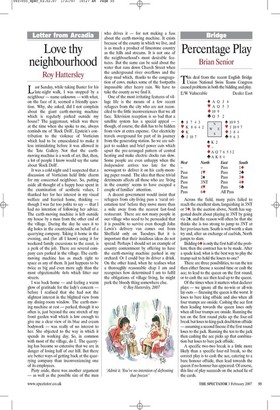Love thy neighbourhood
Roy Hattersley Tast Sunday, while taking Buster for his late-night walk, I was stopped by a neighbour — name unknown — with what, on the face of it, seemed a friendly question. Why, she asked, did I not complain about the giant earth-moving machine which is regularly parked outside my house? The juggernaut, which was there at the time when she spoke to me, always reminds me of 'Rock Drill', Epstein's contribution to the violence of Vorticism which had to be emasculated to make it less intimidating before it was allowed in the Tate Gallery. Not that the earthmoving machine is a work of art. But, then, a lot of people I know would say the same about 'Rock Drill'.
It was a cold night and I suspected that a discussion of Vorticism held little charm for my concerned neighbour. So, putting aside all thought of a happy hour spent in the examination of aesthetic values, I thanked her for her interest in my visual welfare and hurried home, thinking — though I was far too polite to say — that I had no intention of following her advice. The earth-moving machine is left outside my house by a man from the other end of the village. During the day he uses it to dig holes in the countryside on behalf of a quarrying company. Taking it home in the evening, and (for all I know) using it for weekend family excursions to the coast, is a perk of the job. There are several company cars parked in the village. The earthmoving machine has as much right to space as any of them. It just happens to be twice as big and even more ugly than the most objectionable 4x4s which litter our streets.
I was back home — and feeling a warm glow of gratitude for the lady's concern — before I realised that she had not the slightest interest in the blighted view from my dining-room window. The earth-moving machine at rest — parked, though it so often is, just beyond the one stretch of my front garden wall which is low enough to give me a clear view of its blue and cream bodywork — was really of no interest to her. She objected to the way in which it spends its working day. So, in common with most of the village, do I. The quarrying has become so extensive that we are in danger of losing half of our hill. But there are better ways of getting back at the quarrying company than inconveniencing one of its employees.
Piety aside, there was another argument — as well as the possible size of the man who drives it — for not making a fuss about the earth-moving machine. It exists because of the county in which we live, and is as much a product of limestone country as the hills and streams. It is not one of the neighbourhood's most desirable features. But the same can be said about the water that runs down Church Street when the underground river overflows and the deep mud which, thanks to the congregation of cows, makes some of the footpaths impassable after heavy rain. We have to take the county as we find it.
One of the most irritating features of village life is the moans of a few recent refugees from the city who are not reconciled to the little inconveniences that we all face. Television reception is so bad that a satellite system has a special appeal — though, of course, the dish has to be hidden from view at extra expense. Our electricity travels overground for part of its journey from the generating station. So we are subject to sudden and brief power cuts which upset the pre-arranged pattern of central heating and make electric clocks run slow. Some people are even unhappy when the Independent arrives too late for the newsagent to deliver it on his early-morning paper round. The idea that these trivial detriments affects all those who are 'living in the country' seems to have escaped a couple of families' attention.
A decent government would insist that refugees from city-living pass a 'rural orientation test' before they move more than a mile away from the nearest fast-food restaurant. There are not many people in our village who need to be persuaded that it is possible to survive even though John Lewis's delivery van comes out from Sheffield only on Tuesdays. But it is important that their insidious ideas do not spread. Perhaps I should set an example of country contentment by offering to have the earth-moving machine parked in my orchard. Or I could buy its driver a drink. On the other hand, when he realises what a thoroughly reasonable chap I am and recognises how determined I am to fulfil the obligations of village living, he might park the bloody thing somewhere else.
Roy Hattersley, 2007




















































 Previous page
Previous page